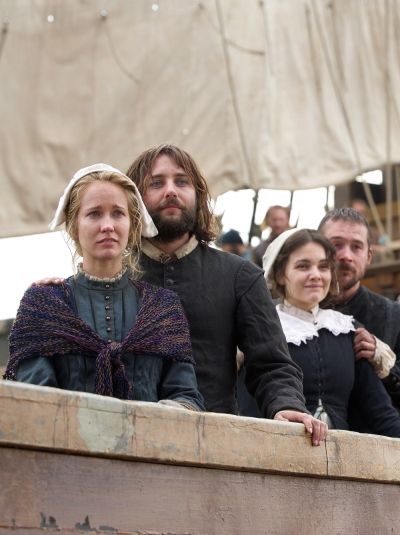1619 or 1620?

Last year marked the culmination of The New York Times’ controversial 1619 Project. The project rightly brought attention to the importance of the African American story of enslavement and 400 year struggle for freedom. But its original claim that the United States was founded in 1619 rather than 1776 went too far. A better year with a compelling story to mark America’s founding is 1620, the year the Pilgrims’ consented to the Mayflower Compact and, shortly thereafter, began America’s experiment in self-government. Today marks the 400th anniversary of the signing of this important document.
To understand the Pilgrims, we must recognize that they were shaped by Judaic and Calvinist political ideas. Of particular importance, in the seventeenth century Calvinist authors began to argue that the Hebrew Scriptures of the Bible sanctioned only republican governments. As Eric Nelson demonstrates in his remarkable book The Hebrew Republic, they adopted this idea from an unlikely source: commentaries on the Old Testament written by Jewish rabbis.
English Calvinists were known as “Puritans” because of their desire to purify the Church of England from perceived corruptions. The Pilgrims were a subset of the Puritans who thought that each Christian congregation should govern itself. Because of their desire to separate from any sort of national church, they became known as “Separatists.” In order to freely practice their faith, a group of them fled to Holland in 1608, and then to America aboard the Mayflower in 1620.
Before the Pilgrims disembarked from the Mayflower, they made a solemn agreement in the style of a biblical covenant that represents an important political innovation. This covenant, known today as the Mayflower Compact, committed the people and their rulers to pursue “the Glory of God, and the Advancement of the Christian Faith, and the Honor of our King and Country.” Its legitimacy stemmed from the consent of the forty-one men heading households on the ship.
The Mayflower Compact is a great example of Hebraic republicanism, but it is far from unique. In the 1630s, great waves of non-Separatist Puritans came to New England where they created literally hundreds of covenants for their civil communities and churches. These agreements joined them together before the eyes of God to pursue specific ends. Each of these covenants reinforced the idea that governments are legitimate and binding because they were established by the consent of the governed.
Not only did the people consent to the formation of governments, most men could participate in town meetings and freemen could be elected representatives of the General Court.
The Pilgrims, and the Puritans who followed them, created civil governments that were among the most republican the world had ever seen.
Early Puritan colonies are often described as theocracies, but this cannot be the case if by “theocracy” we mean either rule directly by God or rule by priests. There were non-Pilgrims or “strangers” aboard the Mayflower, and they too were included in the Compact and could participate in Plymouth Colony’s civic life. Clergy in Massachusetts Bay were initially bannedfrom holding civic offices, and early Puritan legal codes specifically prohibited European institutions such as church courts.
The Puritans were republicans, but they understood that all humans are sinful and prone to corruption. Accordingly, they placed a variety of checks on rulers, including regular elections and legal restraints on civic officials. For instance, the Massachusetts Body of Liberties (1641) contains many protections later found in the Bill of Rights, including prohibitions against double jeopardy, torture, and “in-humane Barbarous or cruel” bodily punishments.
In 1619, enslaved Africans were brought to Jamestown, Virginia, as the 1619 Project reminds us. But when the Massachusetts Captain James Smith kidnapped two West Africans and brought them to Boston in 1645, the General Court considered charging him with “man-stealing” (Exodus 21:16). The Court decided not to try Captain Smith because his offense took place outside of the court’s jurisdiction, but it ordered the two men to be freed and returned them to Africa at the colony’s expense.
The Puritans prohibited slavery except in the case of “lawful captives taken in just wars, and such strangers as willingly sell themselves, or are sold to us.” They eventually followed Jamestown in permitting enslaved Africans in New England, but slavery was never as important in the region as it was elsewhere. Perhaps their biblical culture of equality and consent, as represented by the Mayflower Compact, provided unfertile ground for slavery to take deep root?
The Puritans were not 21st-century liberal democrats, but neither were they intolerant theocrats. They created political institutions that were among the most republican that the world had ever seen, and they strictly limited civic leaders by law. 1620 shouldn’t replace 1776 as the year the United States was founded, but we should nevertheless celebrate the signing of the Mayflower Compact as an important step in the development of American freedom.
Mark David Hall is the Herbert Hoover Distinguished Professor of Politics at George Fox University and an affiliated scholar of the Faith and Liberty Discovery Center in Philadelphia, Pennsylvania. He is the author, most recently, of Did America Have a Christian Founding? Separating Modern Myth from Historical Truth (Nelson Books, 2019).





















